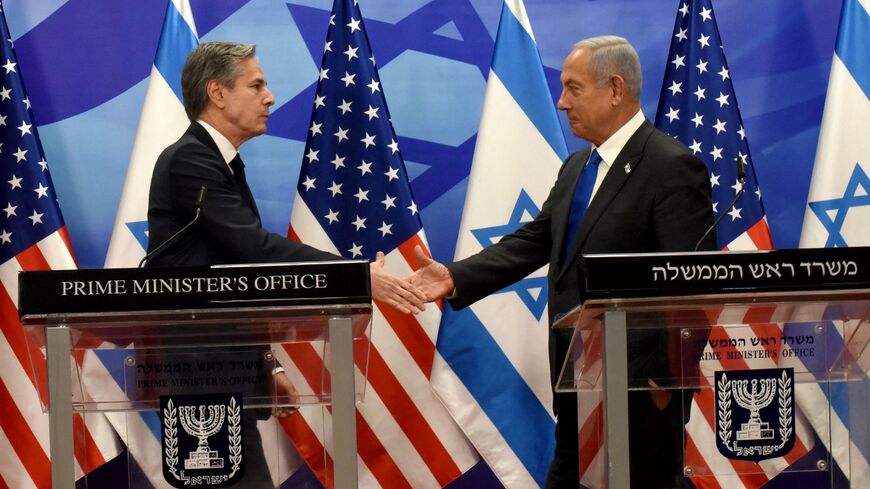Al-Monitor – Israel Prime Minister Benjamin Netanyahu didn’t welcome the civics lesson by US Secretary of State Antony Blinken at a press conference in Israel last week, but he’ll pocket a big win on Iran, and a so-so win on Sudan, which outweigh the friction on other issues during the visit.

Those “other issues” fall into the categories of something old and something new.
Let’s start with the new: the judicial reform package proposed by Netanyahu’s radical right partners in his governing coalition. The Biden Administration appears to agree with a broad spectrum of Israeli civil society that the reform package is a threat to the independence of the judiciary, Israel’s only true check on the executive branch.
While an Israeli domestic matter, the reform legislation does touch on the shared values at the core of the bilateral relationship. That’s the US line, anyway. Netanyahu, for his part, needs the radical right to stay in power, and he may eventually welcome some kind of US pressure for a possible accommodation. That, in turn, depends on whether the right cares about the US-Israel relationship, and what leverage the administration may be willing to employ, besides appealing not to do it.
What may ultimately may force Netanyahu’s hand is the risk of the reforms for foreign investment. The PM considers himself a champion of Israel’s economic and tech renaissance. JP Morgan and Barclays are now warning of the investment risks of the reforms. Netanyahu told a group of foreign investors in Paris today, “What is being said about capital flight is nonsense. We want to increase investments in Israel.”
And then there’s the something old: the US-Israeli-Palestinian diplomatic fire drill to de-escalate yet another round of violence. The appeals to both sides to avoid inflammatory unilateral actions and resume security coordination, the aspirational references to a two-state solution — it all has a familiar rhythm. Netanyahu, and the Biden team, are on well-worn if unwelcome terrain.
This is not to dismiss the potential consequences for a big blowup, especially if anything threatens the historic status quo at Jerusalem’s Haram al-Sharif/Temple Mount and Jordan’s special role in this regard. Netanyahu gets it, but his control over events is not iron-clad. Meanwhile, King Abdullah II was in Washington this week, with this issue top of mind.
Israel rediscovers Sudan
Israel Foreign Minister Eli Cohen flew to Khartoum this week to advance the normalization process, which he hopes to conclude by the end of the year.
Sudan is the elusive fourth Arab party to the September 2020 Abraham Accords, which also include the UAE, Bahrain and Morocco. Closing the deal with Khartoum has been a slog, as Sudan’s military takeover has undercut a once-promising democratic turnaround and the prospect of international assistance for its fragile economy.
In return for agreeing to normalize ties with Israel, the Trump administration removed Sudan from the foreign sponsors of terrorism list, and Gulf states chipped in to pay off the country’s massive debt. These moves allowed Sudan to receive assistance under the World Bank’s Heavily Indebted Poor Countries Initiative (HIPC), but the assistance has since been complicated by the coup.
For Netanyahu, rekindling Sudan as a member of the Abraham Accords serves to remind the world of his bona fides as peacemaker, given the fires on the home front. The other Arab files are complicated by the Palestinian issue. Israel’s top Abraham partner, the UAE, currently serves on the UN Security Council and thus is obliged to represent the Arab consensus there. Netanyahu’s trip to Abu Dhabi appears to be on hold. Saudi Arabia, which Netanyahu hoped to bring into the Abraham fold, will wait until a two-state solution is on track.
All of which made it a good time for a trip to Khartoum. Ben Caspit reports that the Sudan track has the blessings of the US, Egypt and the UAE, all of whom want to see stability in the Horn of Africa. “The American interest,” Caspit writes, “stems from its desire to distance Sudan from the Russian-Iranian axis, to close the large Port Sudan Red Sea port to the Russian navy and to strengthen the global US-led alliance against the Russian-Iranian-Chinese axis.”
Netanyahu windfall on Iran
The real prize for Netanyahu last week is the US-Israel alignment on Iran. There appeared to be no daylight, at least publicly, between Blinken and Netanyahu on Iran. The Iran nuclear deal, once a point of contention, is in cold storage, as US Senator Chris Van Hollen told Al-Monitor Tuesday.
And actions speak louder than words. The US and Israel undertook their largest joint military exercise ever before Blinken arrived. Jared Szuba writes, “Many of the capabilities showcased last week were strikingly similar to those Israel would need to carry out long-range strikes on Iran’s nuclear sites.” He adds that such a military strike, long deemed reckless by US policymakers, is favored by Netanyahu as a necessary contingency.
In exclusive interview with Al-Monitor, Lt. Gen. Gregory M. Guillot, the deputy commander of Central Command, which who oversaw the joint exercise, told Szuba that enhanced coordination with Israel “will make further integration even more seamless.”
Blinken was preceded in Israel by US Director of Central Intelligence William Burns. Iran has blamed Israel for a drone attack on a military facility near Isfahan on Jan. 30.
Sudani asks Biden to keep Iraq out of issues with Iran
The friction between the US-Israel and Iran is worrying news for Iraq.
Iraq Prime Minister Mohammed Shia al-Sudani asked US President Joe Biden today to prevent Iraq from becoming a “springboard” to attack its neighbors.
In Iraq, neighbor means Iran.
Biden called Sudani — his first call to the Iraqi PM — joined by King Abdullah, who was visiting Biden at the White House.
As we wrote from Baghdad in December, “Iraq is inevitable collateral damage when Iran feels threatened and US-Iran relations deteriorate.”
In addition to the attack on the facility near Isfahan, some claim Israel is responsible for recent drone attacks on allegedly Iran-linked armed groups on the Iraq Syrian border, as Shelly Kittleson reports here from Iraq.
Sudani, who assumed office in October 2022, is seeking to prevent another round of Iranian attacks on Iraqi Kurdistan.
In a meeting in Tehran in November, Iranian Supreme Leader Ayatollah Ali Khamenei told Sudani to get control of the border and stand up to the two countries’ “common enemies.” Sudani at the time agreed to take additional steps to secure the border, and insisted that Iran stop its attacks on Iraqi territory, which it did.
That shaky understanding is now at risk.
Sudani is backed by the Coalition Framework, an alliance of Iraqi political parties, many of which have close ties to Iran.
Sudani told the Wall Street Journal last month that he supports an indefinite US troop presence to help combat the Islamic State in Iraq. US forces provide support and training and have stepped back from direct military operations. Last week he told Al-Iraqiya TV that Iraq does not need combat troops.
 Shabtabnews In this dark night, I have lost my way – Arise from a corner, oh you the star of guidance.
Shabtabnews In this dark night, I have lost my way – Arise from a corner, oh you the star of guidance.



